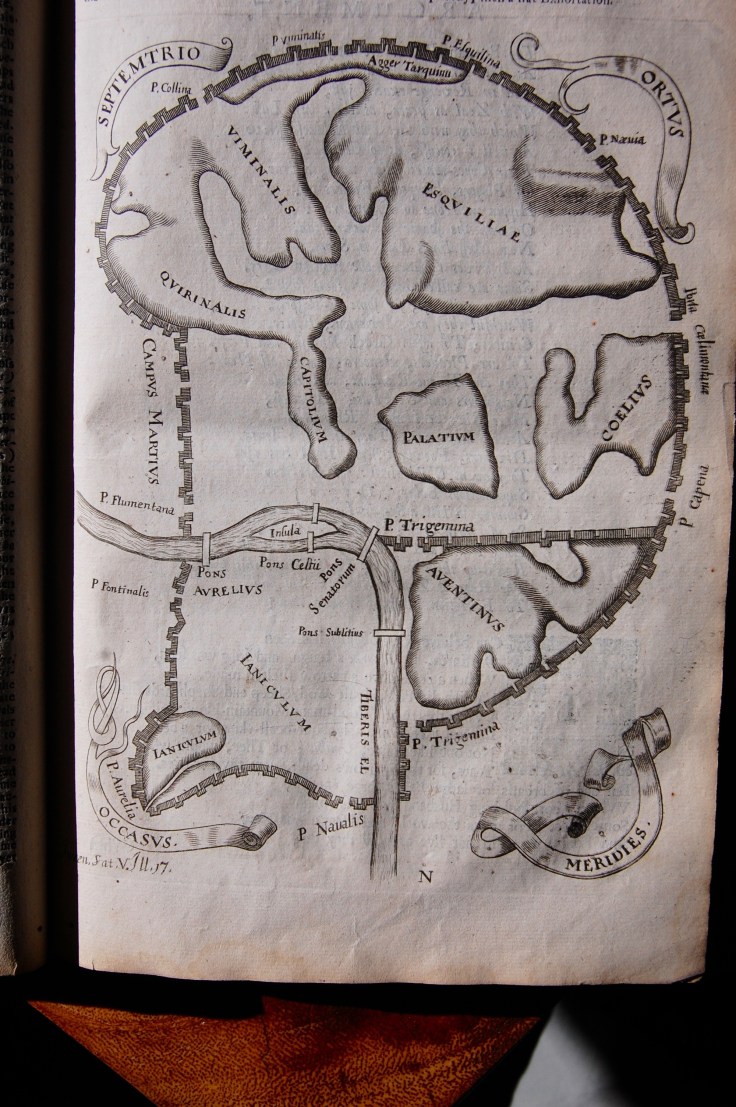737G Juvenal and Persius trans. Barten Holyday 1593-1661
Decimus Junius Juvenalis, And Aulus Persius Flaccus Translated and Illustrated, As well with Sculpture as Notes. By Barten Holyday, D.D. and late Arch-Deacon of Oxon.
Oxford: Printed by W. Downing, for F. Oxlad Senior, J. Adams, and F. Oxlad Junior. Anno Dom. 1673. $1,950

Folio 11 ½ X 7 ½ inches . [π]2, a-b2, B-Z4, Aa-Xx4 (lacking Xx4 blank.)
First edition; first complete edition of all the Satires of Juvenal in English. This copy is bound in full calf reabacked in the early 19th century a nice copy which an early owner has inserted an extra set of plates from the 1726 Dryden edition octavo edition.  The Illustrations in this book include full-paged maps, portraits of the two authors, games, household objects, plants,
The Illustrations in this book include full-paged maps, portraits of the two authors, games, household objects, plants,  animals, architectural styles, city views, and other things the commentator thought a seventeenth century English reader would need to see illustrated in order to better understand the Satires. This is a deftly executed edition with admirable plates. The completeness and breadth of illustrations is impressive, greatly contributing to an English reader’s enjoyment of the Satires.
animals, architectural styles, city views, and other things the commentator thought a seventeenth century English reader would need to see illustrated in order to better understand the Satires. This is a deftly executed edition with admirable plates. The completeness and breadth of illustrations is impressive, greatly contributing to an English reader’s enjoyment of the Satires.

“The present volume may be called sumptuous, for it boasts three full-paged illustrations [i.e., four] and forty-eight smaller [engravings and woodcuts] in the text. […] The [engravings] are nearly all by David Loggan, but unsigned. There is a liberal use of ornaments in which the Sheldonian Press was markedly deficient at this time. […] The Oxford publishers may have wished to show that they could hold their own in the face of the University Press.” (Madan)
Holyday was a dramatist, translator, and divine. Holyday, sometime chaplain to Charles I, was archdeacon of Oxford and the author of Technogamia, or the Marriages of the Arts, a notable academic comedy in English which was acted at Christ Church in 1618. Among friends who helped supply ‘diverse excellent Manuscripts’ of Juvenal were Selden and ‘my dear friend’ Ben Jonson, who ‘sent-in … an ancient manuscript partly written in the Saxon character’. In turn Holyday contributed commendatory verses to Jonson’s Q. Horatius Flaccus His Art of Poetry. This posthumous edition was issued by his step son. It is a line for line translation, devoid of poetry, but rich with learned annotations and interesting illustrations. Samuel Johnson said in Idler 69 that his translations were those of “only a scholar and a critick” not a poet. He was subject of a derisory poem called ‘Whoop Holiday’, published in 1625 by Peter Heylin.

“Juvenal, satirist of Roman vices under the empire. Of his life little is known, although most early accounts agree that he spent some time in military service and ended his life in exile for having criticized a popular stage performer who was a special favorite of the emperor Domitian. He is the author of sixteen satires, divided traditionally into five books. In these biting attacks on public manners and morals. Juvenal shows himself to have been a sharp observer of his fellow men. ‘Whatever men do,’ he announces in his first satire, ‘their devotion, their fear, their rage, their pleasure, their joys, their conversations —all these will make up the potpourri of my little work;’  and he fulfills his pledge with the bitter gusto of an inspired cynic. Unlike Horace, the other great satirist of Roman letters, Juvenal seldom places himself among the foolish, the corrupt, and the frustrated; and while Horace’s satires are conversational in tone and meter, Juvenal’s are tight, rhetorical, and finely polished. He excels in sketching memorable vignettes and small portraits etched in vitriol. His satires abound in witty observations and terse proverbs, among which is the motto mens sana in corpore sano, ‘a sound mind in a sound body.’” (Sandys HCS)
and he fulfills his pledge with the bitter gusto of an inspired cynic. Unlike Horace, the other great satirist of Roman letters, Juvenal seldom places himself among the foolish, the corrupt, and the frustrated; and while Horace’s satires are conversational in tone and meter, Juvenal’s are tight, rhetorical, and finely polished. He excels in sketching memorable vignettes and small portraits etched in vitriol. His satires abound in witty observations and terse proverbs, among which is the motto mens sana in corpore sano, ‘a sound mind in a sound body.’” (Sandys HCS)
 Persius discovered his vocation as a s
Persius discovered his vocation as a s
atirist through reading the 10th book of Lucilius. He wrote painstakingly, and his book of sati
res was still incomplete at his premature death. The book, edited by his friends Cornutus and Caesius Bassus, was an immediate success. The six satires, amounting to 650 lines, are
in hexameters; but what appears as a prologue, in which Persius (an extremely wealthy man) ironically asserts that he writes to earn his bread, not because he is inspired, is in choliambics. The first satire censures literary tastes of the day, reflecting the decadence of national morals. The remaining books are philosophical discussions on themes often treated by Seneca, such as what may rightly be asked of the gods, the necessity of self-knowledge for public men, and the Stoic doctrine of freedom.

Wing J-1276; Madan 2979.




January 28, 2016 at 12:09 PM
superb